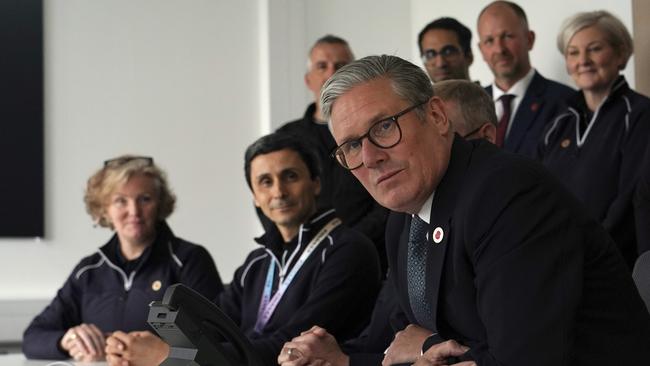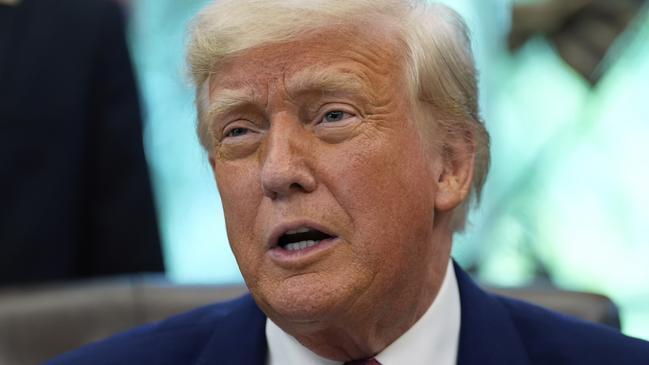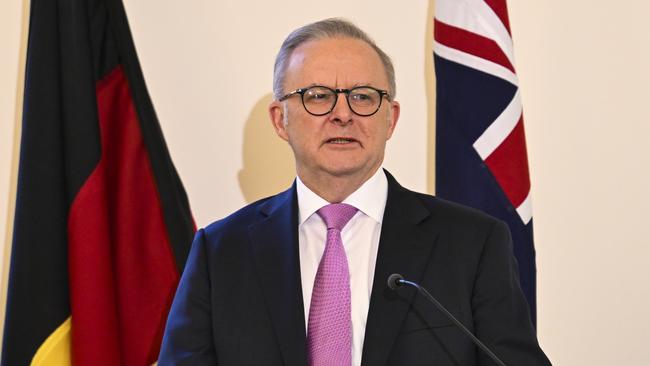US-UK trade deal spells disaster for Australia, expert warns
Australia’s prospects at tariff relief aren’t looking good after a dire agreement between the US and UK was reached, an expert has warned.
Economy
Don't miss out on the headlines from Economy. Followed categories will be added to My News.
A leading economist has warned that the recent UK-US trade deal is a “joke” and doesn’t bode well for Australia’s hopes of relief on steel and aluminium tariffs.
On Friday, US President Donald Trump announced his first post-tariff trade agreement in a “historic deal” with the UK, considered a major win for the US but a loss overall for Britain.
The agreement, which has yet to be fully worked out, will reduce tariffs on British steel, aluminium and aircraft engine exports to the US down to zero. Meanwhile, taxes on up to 100,000 British cars exported annually to the US will be reduced from 27.5 per cent to 10 per cent.
US commerce secretary Howard Lutnick appeared to revel in the fact the baseline tariff remained, saying “We still have our 10 per cent tariff on which will produce $US6 billion of revenue for the United States.”
As a result, the terms of the deal are widely considered worse than the access Britain enjoyed to American markets prior to Mr Trump’s ‘Liberation Day’ tariffs.
That’s a sentiment Shane Oliver, chief economist at AMP, agreed with in an emailed note on Saturday morning and saw it as proof that there was no point caving to Trump’s demands.
“The US/UK trade deal is a bit of a joke and not a good sign for Australia,” he wrote in his note.

…the US/UK trade deal suggests the best Australia can hope for is relief on the 25% tariff on steel & aluminium but the 10% general tariff on Aust exports to the US will remain. (Pharmaceuticals yet to be announced by Trump.) UK shares down -0.3%…altho BoE a factor too.
— Shane Oliver (@ShaneOliverAMP) May 8, 2025
“The 10 per cent baseline tariff remains in place suggesting it will for other countries too,” Mr Oliver warned.
He acknowledged that the deal had not been finalised but said as it stands, the UK had made some bizarre concessions.
“With the UK having to buy more US agricultural and industrial products its unclear why it signed up to the deal as the UK is still far worse off than prior to ‘Liberation Day,’” he said.
As a result, Mr Oliver said there was unlikely to be any benefit for Australia if the government concedes to Trump’s demands.
“The US/UK deal suggests that the best Australia might hope for is relief on the 25 per cent tariff on steel and aluminium (and any future tariffs on pharmaceuticals and movies) but the 10 per cent tariff will remain,” he said.
“So there is little point Australia giving anything up to the US, like easier biosecurity or social media laws.”
Mr Oliver noted that even with the Liberation Day reprieves and various backflips on policy globally, the amount of tariffs being charged for imports coming into the US sits at around 22 per cent, “which is back to levels of early last century”.
Although financial markets have recovered somewhat from the shock of it all, Mr Oliver said that Mr Trump could throw another tantrum at any time.
“Our view remains that its still too early to say that we have seen the bottom in share markets,” he wrote.


The deal was reportedly eked out at the last minute when Mr Trump interrupted UK Prime Minister Sir Kier Starmer watching a football match.
“It’s a great deal for both countries,” said Mr Trump in the Oval Office but with Mr Starmer awkwardly joining the event via a speaker phone from a British car factory.
“The UK is truly one of our great allies,” Mr Trump continued.
“Lots of people say our greatest ally. I don’t want to insult people by saying that, but I can say it’s certainly one of our greatest”.
UK opposition leader Kemi Badenoch was not impressed with the trade deal.
On social media, she said “When Labour negotiates, Britain’s loses. Keir Starmer called this ‘historic’. It’s not historic, we’ve just been shafted!”
UK shadow trade secretary Andrew Griffith said it was a “Diet Coke deal, not the real thing”.
According to media reports, the US-UK deal was finalised unexpectedly quickly when Mr Trump called Mr Starmer at around 9.30pm on Wednesday night, UK time.
The UK PM was engrossed in the second half of a Champions League football match between his beloved Arsenal and Paris St-Germain when Mr Trump dragged him away.
“Thank you very much indeed (Mr President) for that very typical 11th hour intervention demanding even more out of this deal than any of us expected,” an extremely droll British Ambassador to Washington DC Peter Mandelson told Mr Trump in the Oval Office.
“The Prime Minister was delighted to take that call,” he added dryly, suggesting Mr Starmer was far from actually delighted.
Mr Trump was all smiles and told Mr Mandelson he had a “beautiful accent,” a compliment he gave to Mr Starmer too when he was in Washington.
How tariffs impact Australia
Mr Oliver previously warned that the real risk to Australia comes not directly from tariffs on our exports — but from the threat to global growth, particularly in China and Asia, which will likely result in less demand for our exports.
Australia makes billions of dollars by exporting goods to the US, and some industries will cop it when the 90-day reprieve is over.
The biggest Aussie export to the US is meat. Last year Australia shipped US$4 billion (A$6.2 billion) of meat across the Pacific.
The second biggest export is pearls, precious stones and metals, worth US$2 billion. Pharmaceutical products are the third biggest export, worth US$1.4 billion.
Optical, photo, technical, medical apparatuses makes up US$1.2 billion. Machinery, nuclear reactors and boilers make up $1.2 billion.
Electrical and electronic equipment make up US$686 million. Aircraft and spacecraft make up US$663 million.
Labor said earlier this week it had done “everything” it can to secure an exemption from blanket US tariffs and it is now up to the Trump administration to “accept”.
Donald Trump decided not to exclude Australia from baseline 10 per cent imposts on most foreign goods last month.
It dealt another blow to Canberra’s relationship with Washington, which was already bruised on the back of Australia’s inclusion in 25 per cent tariffs on steel and aluminium.
— With Benedict Brooke
Originally published as US-UK trade deal spells disaster for Australia, expert warns





